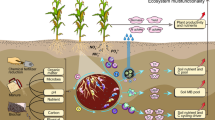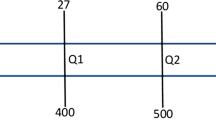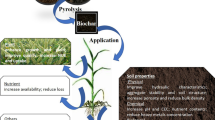Abstract
Purpose
Biochar application to soil is one of the techniques proposed to reduce the adaptive stresses of crops to climate change in the Mediterranean area and sequester carbon in the soil. Biochar application is irreversible and, once applied to soil, persists for centuries. This study aimed to scale up from laboratory to field application data of biochar effect on soil biota and to evaluate the conjoint use of soil microarthropods and ants as bioindicators.
Materials and methods
The experimental site is part of the Long-term Experiment Platform (LTEP) and is a Tuscan vineyard. Biochar was applied to the soil at two doses (22 t ha−1 and 44 t ha−1). Ten years after the biochar application, we analyzed soil properties and biological quality. We assessed the importance of microarthropods and ants as bioindicators to quickly detect the effectiveness, benefits, or threats to soil biodiversity and quality over a long period.
Results and discussion
The results show that the response of different groups of invertebrates varies. Microarthropods and ants may have distinct turnover patterns and be differently affected by biochar. We applied some biological indices, and the soil quality index based on microarthropods (QBS-ar) showed a significant response with higher biological quality related to the single dose of biochar.
Conclusion
Our result underlines how biochar can combine soil protection with carbon sequestration and Mediterranean crop management. A single biochar application promotes the increase of soil biological quality. The application and validation of biological indicators in biochar field studies is a strategy to impart helpful information for environmental safety and support agronomic policies, decision-makers, and regulatory bodies.
Key messages
-
The assessment of biochar effects on soil arthropods over the long term needs to be investigated more.
-
Soil biological quality index showed a significant response, with higher biological quality, related to the single dose of biochar.
-
Biochar application in the field can combine soil protection with carbon sequestration and Mediterranean crop management.





Similar content being viewed by others
References
Amelung W, Bossio D, de Vries W, Kögel-Knabner I, Lehmann J, Amundson R et al (2020) Towards a global-scale soil climate mitigation strategy. Nat Commun 11:5427. https://doi.org/10.1038/s41467-020-18887-7
Andersen AN (1993) Ants as indicators of restoration success at a uranium mine in tropical Australia. Restor Ecol 1:156–167. https://doi.org/10.1111/j.1526-100X.1993.tb00022.x
Andersen AN, Majer JD (2004) Ants show the way down-under: invertebrates as bioindicators in land management. Frontiers Ecol Environ 2:291–298. https://doi.org/10.1890/1540-9295(2004)002[0292:ASTWDU]2.0.CO;2
Anderson MJ, Ellingsen KE, McArdle BH (2006) Multivariate dispersion as a measure of beta diversity. Ecol Lett 9:683–693. https://doi.org/10.1111/j.1461-0248.2006.00926.x
Andrés P, Rosell-Melé A, Colomer-Ventura F, Denef K, Cotrufo MF, Riba M, Alcañiz JM (2019) Belowground biota responses to maize biochar addition to the soil of a Mediterranean vineyard. Sci Total Environ 660:1522–1532. https://doi.org/10.1016/j.scitotenv.2019.01.101
AntWiki (2021) Available at https://www.antwiki.org. Accessed 6 Apr 2022
Baronti S, Vaccari FP, Miglietta F, Calzolari C, Lugato E, Orlandini S et al (2014) Impact of biochar application on plant water relations in Vitis vinifera (L.). Eur J Agr 53:38–44. https://doi.org/10.1016/j.eja.2013.11.003
Baronti S, Magno R, Maienza A, Montagnoli A, Ungaro F, Vaccari FP (2022) Long term effect of biochar on soil plant water relation and fine roots: results after 10 years of vineyard experiment. Sci Total Environ 851:158225
Bielská L, Škulcová L, Neuwirthová N, Cornelissen G, Hale SE (2018) Sorption, bioavailability and ecotoxic effects of hydrophobic organic compounds in biochar amended soils. Sci Total Environ 624:78–86. https://doi.org/10.1016/j.scitotenv.2017.12.098
Brevik EC, Slaughter L, Singh BR, Steffan JJ, Collier D, Barnhart P, Pereira P (2020) Soil and human health: current status and future needs. Air, Soil and Water Res 13. https://doi.org/10.1177/1178622120934441
Brtnicky M, Datta R, Holatko J, Bielska L, Gusiatin ZM, Kucerik J et al (2021) A critical review of the possible adverse effects of biochar in the soil environment. Sci Total Environ 796:148756. https://doi.org/10.1016/j.scitotenv.2021.14875
Castracani C, Maienza A, Grasso DA, Genesio L, Malcevschi A, Miglietta F, Vaccari FP, Mori A (2015) Biochar-macrofauna interplay: searching for new bioindicators. Sci Total Environ 536:449–456. https://doi.org/10.1007/s13593-017-0458-2
Cébron A, Cortet J, Criquet S, Biaz A, Calvert V, Caupert C et al (2011) Biological functioning of PAH-polluted and thermal desorption-treated soils assessed by fauna and microbial bioindicators. Res Microbiol 162(9):896–907. https://doi.org/10.1016/j.resmic.2011.02.011
Colombo C, Miano TM (2015) Metodi di analisi chimica del suolo, 3a versione. Società Italiana della Scienza del Suolo (SISS). ISBN 978–88–940679–0–3
Conti FD, Visioli G, Malcevschi A, Menta C (2018) Safety assessment of gasification biochars using Folsomia candida (Collembola) ecotoxicological bioassays. Environ Sci Pollut Res 25:6668–6679. https://doi.org/10.1007/s11356-017-0806-4
De Bruyn LL (1999) Ants as bioindicators of soil function in rural environments. Agr Ecosyst Environ 74:425–441. https://doi.org/10.1016/S0167-8809(99)00047-X
Ducey TF, Novak JM, Sigua GC et al (2021) Microbial response to designer biochar and compost treatments for mining impacted soils. Biochar 3:299–314. https://doi.org/10.1007/s42773-021-00093-3
FAO and ITPS (2021) The Biochar challenge in viticulture: long-term experiment in central Italy in recarbonizing global soils – a technical manual of recommended sustainable soil management. Volume 4: Cropland, grassland, integrated systems and farming approaches – Case studies. Rome. https://doi.org/10.4060/cb6598en
Farji-Brener AG, Werenkraut V (2017) The effects of ant nests on soil fertility and plant performance: a meta-analysis. Jour an Ecol 86:866–877. https://doi.org/10.1111/1365-2656.12672
Folgarait PJ (1998) Ant biodiversity and its relationship to ecosystem functioning: a review. Biodivers Conserv 7:1221–1244. https://doi.org/10.1023/A:1008891901953
George PB, Keith AM, Creer S, Barrett GL, Lebron I, Emmett BA et al (2017) Evaluation of mesofauna communities as soil quality indicators in a national-level monitoring programme. Soil Bio Biochem 115:537–546. https://doi.org/10.1016/j.soilbio.2017.09.022
Genesio L, Miglietta F, Baronti S, Vaccari FP (2015) Biochar increases vineyard productivity without affecting grape quality: Results from a four years field experiment in Tuscany. Agr Ec Envir 201:20–25. https://doi.org/10.1016/j.agee.2014.11.021
Ghiglieno I, Simonetto A, Donna P, Tonni M, Valenti L, Bedussi F, Gilioli G (2019) Soil biological quality assessment to improve decision support in the wine sector. Agronomy 9(10):593. https://doi.org/10.3390/agronomy9100593
Giagnoni L, Maienza A, Baronti S, Vaccari FP, Genesio L, Taiti C et al (2019) Long-term soil biological fertility, volatile organic compounds and chemical properties in a vineyard soil after biochar amendment. Geoderma 344:127–136. https://doi.org/10.1016/j.geoderma.2019.03.011
Gonçalves F et al (2021) Soil arthropods in the Douro Demarcated Region vineyards: general characteristics and ecosystem services provided. Sustainability 13(14):7837. https://doi.org/10.3390/su13147837
Grossman, RB, Reinsch TG (2002) Bulk density and linear extensibility. In Methods of soil analysis. Part 4, SSSA Book Series No. 5, eds. Dane JH and Topp GC, pp 201–25. Madison, WI: Soil Science Society of America. https://doi.org/10.2136/sssabookser5.4.c9.
Gruss I, Twardowski JP, Latawiec A, Królczyk J, Medyńska-Juraszek A (2019) The effect of biochar used as soil amendment on morphological diversity of Collembola. Sustainability 11(18):5126. https://doi.org/10.3390/su11185126
Hardy B, Sleutel S, Dufey JE, Cornelis JT (2019) The long-term effect of biochar on soil microbial abundance, activity and community structure is overwritten by land management. Front Environ Sci 7:110. https://doi.org/10.3389/fenvs.2019.00110
Haruna S, Nkongolo N (2015) Effects of tillage, rotation and cover crop on the physical properties of a silt-loam soil. Intern Agroph 29:137–145. https://doi.org/10.1515/intag-2015-0030
He M, Xu Z, Sun Y, Chan PS, Lui I, Tsang DC (2021) Critical impacts of pyrolysis conditions and activation methods on application-oriented production of wood waste-derived biochar. Biores Techn 341:125811. https://doi.org/10.1016/j.biortech.2021.125811
Hölldobler B, Wilson EO (1990) The ants. Springer, Berlin
Liu T, Yang L, Hu Z, Xue J, Lu Y, Chen X et al (2020) Biochar exerts negative effects on soil fauna across multiple trophic levels in a cultivated acidic soil. Biol Fertil Soils 56:597–606. https://doi.org/10.1007/s00374-020-01436-1
Llovet A, Mattana S, Chin-Pampillo J, Gascó G, Sánchez S, Mondini C et al (2021) Long-term effects of gasification biochar application on soil functions in a Mediterranean agroecosystem: higher addition rates sequester more carbon but pose a risk to soil faunal communities. Sci Total Environ 801:149580. https://doi.org/10.1016/j.scitotenv.2021.149580
Luo X, Liu G, Xia Y, Chen L, Jiang Z, Zheng H, Wang Z (2017) Use of biochar-compost to improve properties and productivity of the degraded coastal soil in the Yellow River Delta, China. J Soils Sediments 17:780–789. https://doi.org/10.1007/s11368-016-1361-1
Maaß S, Hückelheim R, Rillig MC (2019) Collembola laterally move biochar particles. Plos one, 14(11):e0224179. https://doi.org/10.1371/journal.pone.0224179
Maienza A, Baronti S, Cincinelli A, Martellini T, Grisolia A, Miglietta F et al (2017) Biochar improves the fertility of a Mediterranean vineyard without toxic impact on the microbial community. Agron Sustain Dev 37:47. https://doi.org/10.1007/s13593-017-0458-2
Maienza A et al (2022) The QBS-ar index: a sensitive tool to assess the effectiveness of an agroecological practice in the Italian Alpine Region. J Soil Sci Plant Nutr 22:3740–3744. https://doi.org/10.1007/s42729-022-00923-8
Madej G, Barczyk G, Gdawiec M (2011) Evaluation of soil biological quality index (QBS-ar): Its sensitivity and usefulness in the post-mining chronosequence-Preliminary research. Polish Journ Environ Studies 20(5):1367–1372
Manh VuQ, Nguyen TT (2000) Microarthropod community structures (Oribatei and Collembola) in Tam Dao National Park. Vietnam J Biosci 25(4):379–386. https://doi.org/10.1007/bf02703791
Menhinick EF (1964) A comparison of some species-individuals diversity indices applied to samples of field insects. Ecology 45(4):859–861
Menta C, Conti FD, Pinto S (2018) Microarthropods biodiversity in natural, seminatural and cultivated soils—QBS-ar approach. Appl Soil Ecol 123:740–743. https://doi.org/10.1016/j.apsoil.2017.05.020
Menta C, Remelli S (2020) Soil health and arthropods: from complex system to worthwhile investigation. InSects 11(1):54. https://doi.org/10.3390/insects11010054
McGlynn TP, Fawcett RM, Clark DA (2009) Litter biomass and nutrient determinants of ant density, nest size, and growth in a Costa Rican tropical wet forest. Biotropica 41:234–240. https://doi.org/10.1111/j.1744-7429.2008.00465.x
Ostiande N, Giffard B, Bonnard O et al (2021) Multi-community effects of organic and conventional farming practices in vineyards. Sci Rep 11:11979. https://doi.org/10.1038/s41598-021-91095-5
Palansooriya KN, Wong JTF, Hashimoto Y et al (2019) Response of microbial communities to biochar-amended soils: a critical review. Biochar 1:3–22. https://doi.org/10.1007/s42773-019-00009-2
Parisi V, Menta C, Gardi C, Jacomini C, Mozzanica E (2005) Microarthropod communities as a tool to assess soil quality and biodiversity: a new approach in Italy. Agri Ecos Environ 105(1–2):323–333. https://doi.org/10.1016/j.agee.2004.02.002
Pielou EC (1969) An introduction to mathematical ecology. New York, USA, Wiley-Inter-science
Sanders NJ, Moss J, Wagner D (2003) Patterns of ant species richness along elevational gradients in an arid ecosystem. Glob Ecol Biogeogr 12:93–102. https://doi.org/10.1046/j.1466-822X.2003.00324.x
Santorufo L, Van Gestel Cornelia AM, Maisto G (2014) Sampling season affects conclusions on soil arthropod community structure responses to metal pollution in Mediterranean urban soils. Geoderma 226:47–53. https://doi.org/10.1016/j.geoderma.2014.02.001
Satta A, Verdinelli M, Ruiu L, Buffa F, Salis S, Sassu A, Floris I (2012) Combination of beehive matrices analysis and ant biodiversity to study heavy metal pollution impact in a post-mining area (Sardinia, Italy). Environ Sci Pollu Res 19:3977–3988. https://doi.org/10.1007/s11356-012-0921-1
Shannon CE (1948) A mathematical theory of communication. The Bell System Technical Journal 27(3):379–423
Scheller U (2003) New records of Pauropoda (Myriapoda) with descriptions of new species from Rwanda and Réunion (Pauropoda and Symphyla of the Geneva Museum XII). Rev Suisse Zool 110(2):325–354. https://doi.org/10.5962/bhl.part.80188
Segat J, Vasconcellos R, Silva D, Barreta D, Cardoso E (2017) Ants as indicators of soil quality in an on-going recovery of riparian forests. Forest Ecol Manag 404:338–343. https://doi.org/10.1016/j.foreco.2017.07.038
Simpson EH (1949) Measurement of diversity. Nature 163(4148):688–768
Singh H, Northup BK, Rice CW, Prasad PV (2022) Biochar applications influence soil physical and chemical properties, microbial diversity, and crop productivity: a meta-analysis. Biochar 4(8). https://doi.org/10.1007/s42773-022-00138-1
Tsiafouli MA et al (2005) Responses of soil microarthropods to experimental short-term manipulations of soil moisture. App Soil Ecol 29(1):17–26. https://doi.org/10.1016/j.apsoil.2004.10.002
Underwood EC, Fisher BL (2006) The role of ants in conservation monitoring: if, when, and how. Biol Cons 132(2):166–182. https://doi.org/10.1016/j.biocon.2006.03.022
Vaccari FP, Maienza A, Miglietta F, Baronti S, Di Lonardo S, Giagnoni L et al (2015) Biochar stimulates plant growth but not fruit yield of processing tomato in a fertile soil. Agric Ecos Environ 207:163–170. https://doi.org/10.1016/j.agee.2015.04.015
Verdinelli M, Yakhlef SEB, Cossu CS, Pilia O, Mannu R (2017) Variability of ant community composition in cork oak woodlands across the Mediterranean region: implications for forest management. iForest 10:707–714. https://doi.org/10.3832/ifor2321-010
Verdinelli M, Pittarello M, Caria MC, Piga G, Roggero PP, Marrosu GM, Arrizza S, Fadda ML, Lombardi G, Lonati M, Nota G, Sitzia M, Bagella S (2022) Congruent responses of vascular plant and ant communities to pastoral land-use abandonment in mountain areas throughout different biogeographic regions. Ecol Process 11:35. https://doi.org/10.1186/s13717-022-00379-9
Acknowledgements
The authors acknowledge the staff of “Marchesi Antinori—La Braccesca Estate” for their technical support and for hosting the experiment. The authors are grateful to Alison Gariside for her English check revision of the manuscript. The Italian Biochar Association (ICHAR- www.ichar.org) is also acknowledged.
Author information
Authors and Affiliations
Corresponding author
Ethics declarations
Conflict of interest
The authors declare no competing interests.
Additional information
Responsible editor: Hailong Wang
Publisher's Note
Springer Nature remains neutral with regard to jurisdictional claims in published maps and institutional affiliations.
Rights and permissions
Springer Nature or its licensor (e.g. a society or other partner) holds exclusive rights to this article under a publishing agreement with the author(s) or other rightsholder(s); author self-archiving of the accepted manuscript version of this article is solely governed by the terms of such publishing agreement and applicable law.
About this article
Cite this article
Maienza, A., Remelli, S., Verdinelli, M. et al. A magnifying glass on biochar strategy: long-term effects on the soil biota of a Tuscan vineyard. J Soils Sediments 23, 1733–1744 (2023). https://doi.org/10.1007/s11368-023-03447-5
Received:
Accepted:
Published:
Issue Date:
DOI: https://doi.org/10.1007/s11368-023-03447-5




